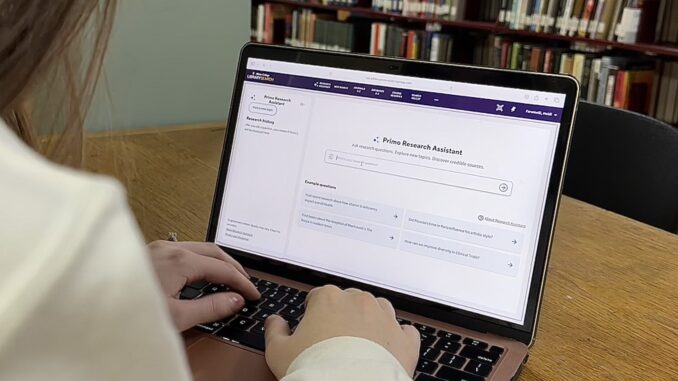
News publications like the BBC have written about the similarities between movies like “The Terminator” (1984) and our modern relationship with artificial intelligence (AI).
Here at Albion, “The Terminator” doesn’t dominate conversations. Instead, discussions amongst faculty, administrators and students center around AI being used for career and research tools, as well as classroom policies.
In the Classroom
Provost and professor of chemistry Lisa Lewis said currently, “one of the things we don’t have is a formal policy that crosses all disciplines.”
Mason senior Grace Halstead said she’s “very anti-AI in all aspects” and thinks “AI is a shortcut, and it’s not good for the development of our brains and creativity.”
Regarding classroom policies, Halstead said AI use should remain up to professors since “it’s their classroom.” However, she added, “our college should have at least a policy saying ‘we don’t advise to use it.’”
“It’s confusing that I have certain professors saying, ‘If you use AI you’ll get a zero,’” Halstead said. “And there’s some who are saying, ‘You should use it.’ I don’t like that.”
Director of Instructional Technology and User Services Chris Gott, who runs an AI user group for faculty on campus, said he thinks about the “confusing landscape” for students regarding professor’s policies, adding “that’s just the nature of where we are on this curve.”
“I think we need to be building some loose framework that maintains the freedom of professors to match the use to their specific use case, and provide some sort of guardrail so that your experience as a student is less mercurial as you go between courses,” Gott said.
Lewis said AI is “a bit of a polarizing idea still.” She added that “there is going to be this time where we’re figuring it out” and that the college is anticipating gaining “greater clarity along the way.”
Lewis also said the way Albion manages AI policies centers the idea that “different disciplines use AI in very different ways.”
“The reason we don’t have a formal policy that crosses all disciplines is because different disciplines use it differently,” Lewis said. “What we do in this space is ask individual professors in their courses to articulate the use of AI in that course.”
Gott said “some of the conversations that are happening” are asking professors to “put in writing” what their AI policies are.
Programs Available for Students
Gott said AI is “a catch-all term” for hundreds of different tools, “from things as simple as the most basic levels of Grammarly to really elaborate custom-created bots.”
“I think we need to start changing our conversation to talk about specific tools instead of AI as a thing,” Gott said.
Two tools the college offers include Quinncia, through the Career and Internship Center (CIC), and Primo Research Assistant through the Albion College Library.
Director of the CIC Troy Kase said Quinncia assists with resumes, interviewing and LinkedIn, adding that “our system doesn’t do it for the student.” He added Quinncia provides a way for students to get feedback “anytime they want.”
However, regarding resume checks and interview preparation, Kase said, “it will not provide you with the same level of practice that you’ll get with doing this one on one,” adding his “personal knowledge” of students cannot be replaced by AI.
“This will review your resume and say, ‘You need to format this, you need to date this right,’” Kase said. “But there’s that element of us knowing who you are as a human, what your motivations are and helping you to articulate that in the document.”
Library Director and Head of Library Systems and Technology Jill Marie Mason said the Primo Research Assistant helps “to formulate search queries and build keywords search strings,” since students may often use natural language while researching.
“You can just enter natural language, and then it will formulate a more effective search query, rather than using all of these filler words,” Mason said.
Mason added the tool is “just mining our resources” and “not mining the web at large.” Mason said though she uses AI “sparingly,” she engages with AI to “understand its limitations and what it can do, and how students can use it in the most efficient or ethical ways.”
“This stuff is happening, no matter what. So academia means to play a role in shaping it,” Mason said. “If we don’t play a role in shaping it, we’re just sort of relenting to these outside forces.”
The Future of AI at Albion
Gott said that if anti-AI and pro-AI people got together in one room, they could “solve most of this problem by talking through it.”
“They’re not going to end up on the same page, and that’s okay,” Gott said. “But if we can get them all reading from the same book, I think that’s pretty useful.”
Lewis said “we’re really at the cusp” of figuring out how to navigate AI and “make sure we’re graduating graduates with the skills they need to succeed when they leave us, which includes using AI well,” adding students also have to be able to think for themselves.
Lewis added, “there are things that are unique to us,” and AI will never be human. She said “there’s no better place than a liberal arts college” to help students grow skill sets relating to AI and their humanity.
“We can’t leave a computer to do our work that is inherently about compassion or empathy or caring or support,” Lewis said. “So we have to understand its limits.”

Leave a Reply